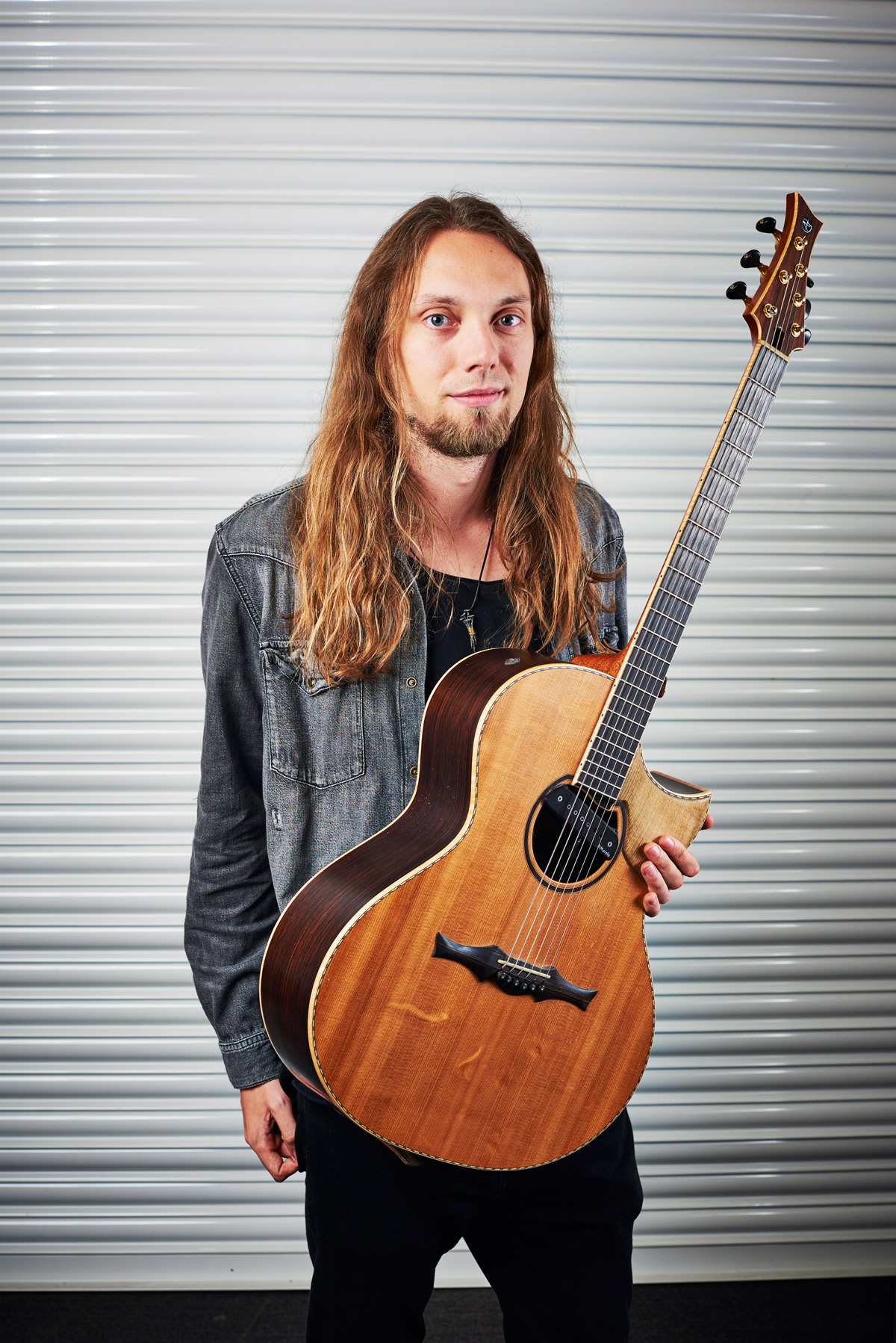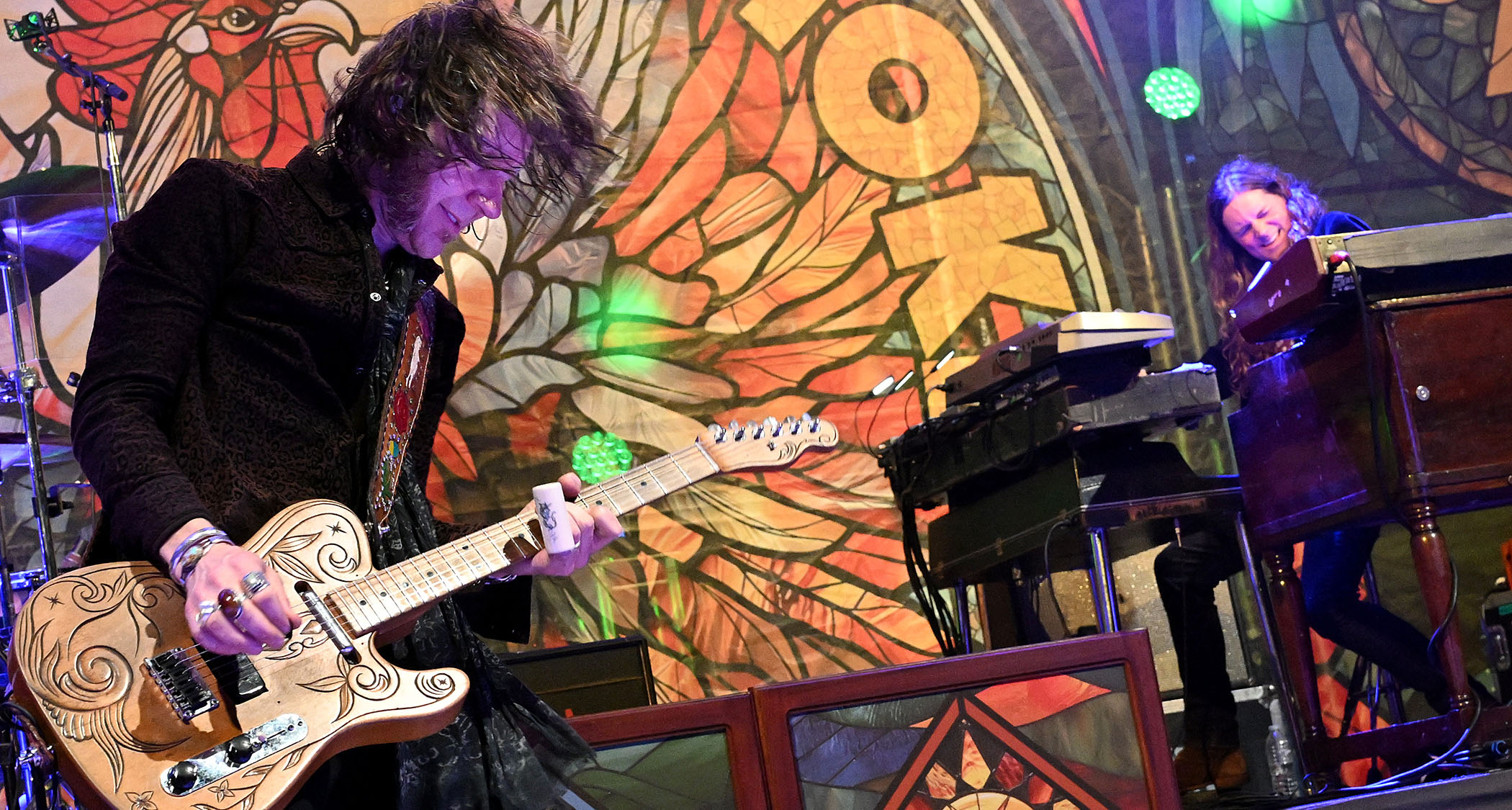Mike Dawes: “Guitar right now is heavily edited, very engineered to engage, snippets of sound – the result is music that doesn’t sound like a journey”
Fresh off the back of his latest EP with Tommy Emmanuel, the fingerstyle acoustic virtuoso reflects on the state of the guitar in the social media age, the benefits of practicing songs in the wrong tunings, and why every solo guitarist should have an imaginary drummer

All the latest guitar news, interviews, lessons, reviews, deals and more, direct to your inbox!
You are now subscribed
Your newsletter sign-up was successful
It’s been something of a banner year for fingerstyle virtuoso Mike Dawes. He spent a significant part of 2022 on a world tour with Tommy Emmanuel, in addition to playing his own headline solo gigs, and holding down his job as guitarist in Justin Hayward’s band.
Dawes has been a professional touring musician for the better part of a decade, spending 10 or 11 months a year on the road. Consequently, extended pandemic lockdowns took a toll on him, both professionally and personally. Being back on tour, he says, made this “the most exciting year since I was 17 years old and discovering the acoustic guitar – it really feels like starting again.”
Said restart has primed him for an intensely busy 2023. He has a new album in the works, which he only hints at in this interview. And of course he’ll be on the road nonstop, both on his own and with Tommy Emmanuel, performing tracks from their recent EP, Accomplice Series Vol. 3.
As always, Dawes will make it all seem effortless – a feat that in fact requires considerable effort, as he explains below.
How did you develop the percussive element and timing in your playing?
“I remember seeing a wonderful lecture online from Victor Wooten. He was talking about playing solo and how to really get in the groove. He was saying that what he does is imagine a drummer that you're jamming with playing alongside you in the room.
“Your imagination can run wild for what that drummer is doing, but of course that drummer is certainly staying in time. That's the core purpose of this thought experiment.
All the latest guitar news, interviews, lessons, reviews, deals and more, direct to your inbox!
“I started doing that not just when I play electric, but when I play acoustic solo, because when I'm doing my solo arrangements I don't have a metronome or click track or anything in my ears, like many rock bands do, or even a drummer. So I imagine the drummer playing along, and if I'm feeling wobbly about the time that's what I try to do consciously to lock myself back in. It really does work.
“I remember specifically a gig I did in Florida in 2014. Someone came up to me at the merch table and said, ‘Oh my God, that was amazing, but you kept rushing during one song.’
I'm not consciously thinking about the drummer the whole time. It's almost like when you're driving and you're kind of on autopilot, and then suddenly you think, ‘Oh, I should be thinking about driving right now’
“I was taken aback and defensive, like, ‘You must be mistaken. What are you talking about?’ And then I went on YouTube and saw a bootleg from that specific gig, and it's true – I was rushing. It was then that I started thinking about that Victor Wooten lecture and imagining a drummer. It really helps. I'd recommend people try it out.”
When you're thinking about what the imaginary drummer is doing, how do you focus on what you're doing at the same time?
“I'm not consciously thinking about the drummer the whole time. It's almost like when you're driving and you're kind of on autopilot, and then suddenly you think, ‘Oh, I should be thinking about driving right now,’ so you bring yourself back into the present. In terms of guitar, I'm usually thinking about only one of my hands, and the other hand is muscle memory.
“There's also certain cue points in songs where I focus heavily on one particular line. If you asked me to stop and start again, I'd have to start at one of those specific points. I wouldn't be able to just start on any random 16th note. I have to start on one of these cue points. So a combination of those cue points and one hand muscle memory, plus general daydreaming. That's how I get through the concert.
“That's actually something they proved years ago, that musicians have these little cue points. You can't just pick up a piece from any random beat. It has to be from some predetermined little gateway in your mind. I always found that interesting.”
Let's talk about a couple of things that are more difficult than you make them seem: care and maintenance of hand strength and dexterity.
“I’d like to say that I do rigorous warm-up exercises now, and there was a period where that was true. But the schedule dictates that I'm playing concerts so regularly that the best warm-up for me is to run the songs. What I typically do is practice the songs from least demanding through to most demanding. That doubles as my rehearsal for the show as well.
“One thing I do, much to the horror of those around me, is I will practice these songs in completely wrong tunings usually, and the reason I do that is to save the guitar strings, because many of my songs are in different tunings. If I'm constantly changing tunings every time I want to practice a song, the strings are going to break, and I'm terrified of them breaking onstage.
“So backstage I usually tune to the tuning of the first song of the show. But then I'll practice all of the songs in that tuning, and it's hilarious because it sounds absolutely horrible. People are looking at me, thinking, ‘God, this guy's horrible!’
“That's something I do, and then my friends enjoy when I’ve stopped playing. Sometimes you discover some really magical chords, if you're putting your hands in these positions and in completely wrong tunings. You can come up with some cool ideas, actually.
I did lose my calluses briefly during the pandemic because I did not pick up a guitar for about six months, and it did take me a little bit to build them back
“The way I play, the two-hand technique, does build up your strength on both hands. I did lose my calluses briefly during the pandemic because I did not pick up a guitar for about six months, and it did take me a little bit to build them back.
“The thing I noticed is that as long as I'm playing at least a couple of times a month, I'll maintain my calluses. But the climate changes them. If I go to a very humid country, then sometimes the calluses disappear and it suddenly becomes very painful to play. That's just the nature of the beast.
“There was one place I went to with Tommy Emmanuel, it might have been Florida, and we were both complaining about how much it hurt playing the guitar – and that's Tommy Emmanuel, who’s been playing forever.
“Justin Hayward has that problem sometimes as well. When we were rehearsing in Tennessee, it was the same thing. So sometimes the physics of our planet get in the way a little bit. But I don't consciously have to rest or anything like that. If anything, I have to make sure that I'm playing regularly to maintain them.”
How did you develop your style and sound?
“When I was starting out, I was always thinking that exactly: ‘How do I get my own sound? What do I need to do so that people can identify something as me when they hear it?’
“There are some guitar players I've listened to and I wouldn't be able to distinguish who they are versus another twenty guitar players, but then there are some players with incredibly unique voices. When Tommy Emmanuel plays, I know it's him. When Antoine Dufour plays, I know it’s him.

“There was almost a eureka moment, which firstly was that it’s okay to try anything you want to do. When I was starting, I was thinking, ‘Is it okay to play this lick? Would Andy McKee play this lick?’
“When I stopped thinking like that, that's the moment people started coming up to me, saying, ‘I love your sound,’ or ‘I can always tell when it's you playing.’ It's just breaking down the rules, understanding that it's okay to try any kind of technique, tuning, passage, whatever it is.
“When you do that enough times, that will become something that is unique for you, not to mention your own diverse set of experiences. Everyone's influences are different, everyone's path is different, so they will all sound unique. It's just whether or not they choose to really explore and let go of that rulebook.
“That's just my own opinion based on my experiences. It's okay to try anything new. You are allowed. I actually can’t wait for people to hear my next album. It’s different.”
I love doing my best to make people happy, and the experience of dealing with drunk English people really helped that journey
Have you ever encountered the sea of folded arms?
“Oh yeah, of course. I grew up playing open mic nights in pubs to a bunch of drunk English people on Friday nights. That teaches you to not only not care about that kind of response, but to engage with it and try your best to manipulate it to your advantage.
“I don’t think I would enjoy live performance as much if I didn’t spend a year around the south of London, playing open mic nights as many weeks as I could. You encounter all sorts of personalities, and that teaches you to deal with an audience, work an audience, and more importantly, entertain the audience.
“That’s the whole point: trying to make people forget about their mortgages for the evening. So I love that. I love that manipulation. I don’t use the word ‘manipulation’ in a manipulative way. I love doing my best to make people happy, and the experience of dealing with drunk English people really helped that journey.”
How do you push yourself as a guitarist? At the same time, is there a risk of self-indulgence? If so, how do you keep from crossing that line?
“Absolutely, and I think that line is getting progressively blurred during the internet age, when you have suddenly a ton more musicians all competing for the same eyeballs. The problem is that we have a situation where, algorithmically, we’re having to catch and maintain people’s attention in the shortest possible window.
“The net result is music that doesn’t really sound like a journey, doesn't really sound like an experience, but it sounds like a slap in the face because it has to, in order to grab people's attention.
“This is where I see both electric and acoustic guitar right now: heavily edited, very engineered to engage, snippets of sound. Now, because I’m a live guy and I've always enjoyed being on the road, you can't get away with that and hold people's attention for more than that initial ‘wow’, so my material has to, by definition, be engineered for a longform journey. It has to bring people up, it has to bring people down, it has to make people laugh, it has to make people cry.
The thing that I hope I'm doing differently is engaging an audience for not just four seconds online, but for an hour at a show
“You can't do that in the online space and expect anyone to care or anyone to even see your stuff. So by definition of loving the live show format, there's certain ways I have to write. I like to think I'm treading a line that resonates with people, because that's exactly how I've been able to have people unfold their arms.
“You can't go one hundred miles an hour all the time. But that's where we're at with the online culture right now, or for those who want the clicks, which is obviously everyone on some level. I could talk about that for days.
“The thing that I hope I'm doing differently is engaging an audience for not just four seconds online, but for an hour at a show… and they will let you know if you're not.
“Hopefully what stops me from crossing the line into candy and sugar without the substance is that the audience will let me know. That's the best possible answer I can give, really. The audience will let me know if I'm going too far into chaos.
“And having the respect of people like Tommy Emmanuel means the world, because he's the king of music and the king of guitar. So, occasionally, the old pat on the back from one of my guitar heroes doesn't hurt.”
I’ve heard musicians say that there are times when they get sick of their own playing. Does this happen to you?
“Oh, yeah. ‘My playing is garbage, I hate everything I do.’ That's just the way it is. When one creates a piece of music, once it's out there in recorded format, or if you're playing it live, it no longer belongs to you. You're not responsible for how it's received, and you shouldn't therefore feel negatively affected by it, because it's not yours to be negatively affected by anymore. You're putting something out there for people to internalize and respond to, as that’s their right.
“If you understand that, when you're playing a song live, it doesn't matter if you're liking it or not. If I'm having a crappy day, it's still my job to try and brighten someone's day, so if I'm playing a tune that I'm not really feeling, but I know people in that room want to hear it, then it's my responsibility to play it, because I don't have the right to it anymore.
“I've created it and put it out there. During the creation process, it's all thrills and loveliness, but once I put it out there, it's my responsibility to entertain the people who have come to see me play and give them the songs that they want to hear. That being said, I do indulge in the occasional self-indulgent deep cut!”
I can’t think of any world where I would be doing anything else. I’ve always wanted to be a professional guitar player, and it’s a privilege to be able to do that
What is the difference between playing guitar and being a guitarist?
“I would say the difference is not limiting yourself to that box, being open to all musical ideas, and being inspired by whatever the people around you are playing. For example, I used to go to drum workshops. I’m not a drummer, but I would always learn something.
“To associate that with the word ‘guitarist’, I suppose, would be how much of your identity it consumes. I can’t think of any world where I would be doing anything else. I’ve always wanted to be a professional guitar player, and it’s a privilege to be able to do that.
“It also comes down to intent as well. Are you playing because you want to impress your friends, or are you playing because you have to? Personally, I have to, so I hope that encourages any people that want to take it seriously.”
- Mike Dawes and Tommy Emmanuel's new EP, Accomplice Series Vol. 3, is out now via CGP Sounds.
Alison Richter is a seasoned journalist who interviews musicians, producers, engineers, and other industry professionals, and covers mental health issues for GuitarWorld.com. Writing credits include a wide range of publications, including GuitarWorld.com, MusicRadar.com, Bass Player, TNAG Connoisseur, Reverb, Music Industry News, Acoustic, Drummer, Guitar.com, Gearphoria, She Shreds, Guitar Girl, and Collectible Guitar.
